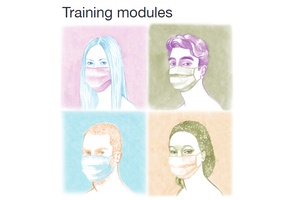Community capacity building modules to accelerate DR-TB response
Community capacity building modules to accelerate the response to drug-resistant TB launched at WHO meeting of national TB program managers and partners in the South-East Asia region.
13 May 2019 | Delhi: Close to 100 representatives from countries, partners and civil society came together at the World Health Organization (WHO) South-East Asia Regional Meeting of National TB Program Managers and Partners being held in New Delhi from 13-15 May 2019. New training modules were launched by community representatives, WHO and partners, at the opening of the meeting on building the capacity of and empowering affected communities to accelerate the response to drug-resistant TB (DR-TB) in the South-East Asia region. The development of the modules was led by affected community representatives through the Global Coalition of TB Activists and WHO/SEARO, along with inputs from partner agencies like the Stop TB Partnership and International Federation of Red Cross and Crescents (IFRC).
WHO Regional Director for the South-East Asia Region Dr Poonam
Khetrapal Singh in her opening message said, “Community
engagement must be a core priority for all countries, whether
low- or high-prevalence. Rather than passively implementing
policies that come from above, affected communities should be
part of the policy development process, with community
recommendations reflected in public health policies. A medical
approach alone will not solve the TB problem. The modules
launched today are aimed at building the capacity of affected
communities to meaningfully engage with national programs at all
levels – from planning to implementation and
monitoring.”
Blessina Kumar, CEO of the Global Coalition of TB Activists
added, “A community that is empowered with information and
understands TB science is a valuable resource to partner with
the national, regional and global efforts to #EndTB. For this to
become a reality, investment into building capacity of the
community is crucial. I congratulate WHO/SEARO for taking this
brave initiative to develop capacity building tools for training
affected communities. A tool for the community by the community!
Thank you to all the partners and colleagues who gave their
valuable input and feedback. This is a living document and can
be updated as the TB response evolves with new
developments.”
It is now being accepted that closing the gap on treatment for
all and improving prevention would require extensive community
involvement. Community involvement, instead of a top down push,
will require building the capacity of and empowering community
leaders and workers. Community workers will need to be able to
both communicate about TB, a stigmatised disease, as well as
enable access to those who need diagnosis and treatment.
Affected communities and community based organizations can play
a crucial role in ensuring a person-centred and human
rights-based approach in the management of drug-resistant TB,
provided their capacity is built with appropriate training to
understand the science and management of drug-resistant TB.
“We cannot reach the targets of the UN High Level Meeting
on TB and the End TB Strategy without meaningful community
engagement and empowerment,” said Dr Tereza Kasaeva,
Director of WHO’s Global TB Program. “We commend the
leadership of communities, partners and the WHO/SEARO in
developing these training modules to empower and build the
capacity of communities to end drug-resistant TB. We look
forward to this being adapted to local contexts and also being
replicated in other regions.”
WHO and partners will support national programs in the adoption
of the modules and in using them to train community
representatives, specifically those from affected communities.
This will enable communities to contribute meaningfully to all
levels of the national program - from planning to monitoring to
delivery of appropriate services. The modules have also been
reviewed during the Stakeholders’ consultation meeting in
Dhaka where members of WHO global civil society task force,
NGOs, donor agencies like the Global Fund and the national
programs were represented.
Source:
WHO


